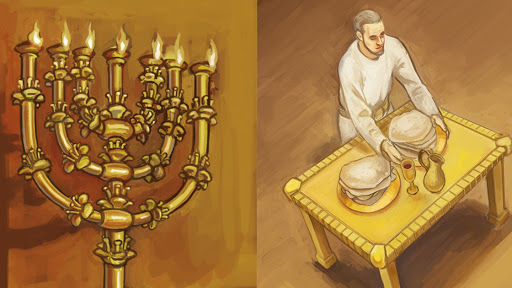Then the Lord spoke to Moses, saying, “Command the children of Israel to bring you pure oil of pressed olives for the light, to make the lamps burn continually. Outside the veil in the tabernacle of testimony, Aaron and his sons shall keep it burning from evening until morning before the Lord continually; it shall be an ordinance forever in your generations. Upon the pure lampstand, you shall burn the lamps before the Lord until morning.” (Lev 24:1–4)The Lord restates an instruction given previously for the construction of the Tabernacle (Ex 27:20–21) that the lampstand was to shed light continuously, day and night. We can understand why light would need to be shone during daylight hours: when the priest went inside the Holy Place to perform duties, the light would keep him from stumbling. The reason for nocturnal use is not so obvious unless we understand that the light being given is God’s light: He has provided it for the priest to properly do his work. Therefore, because the light is God’s, it must shine perpetually, so the priest must attend to the lampstand daily to ensure the light never goes out. In a similar fashion, Christians are asked to do the same with the light of the Scriptures. God’s Word is a lamp and light (Ps 119:105), and while it is eternal, it needs our attention for effective use. True, nothing needs to be added in order for the light to shine; however, for it to shine in and through us during our priestly work, we need to daily spend time in its illumination that the light we work by and reflect does not dim or become extinguished.
The loaves on the table were the Lord’s provision that the priests would be nourished in their daily duties.
“You shall also take fine flour and bake twelve cakes with it. Two-tenths of an ephah shall be in each cake. You shall set them as two deposits, six loaves in each deposit, on the pure table before the Lord. Then you shall put pure frankincense and salt on each deposit, that it may be on the bread for a memorial offering to the Lord. Every Sabbath day it shall be placed before the Lord continually, in the presence of the children of Israel by an everlasting covenant. It shall be for Aaron and his sons, and they shall eat these things in a holy place; for this is most holy to him from the things sacrificed to the Lord, as a perpetual ordinance.” (Lev 24:5–9)Here, too, we find another type of Scripture. Once each week we are called to ensure the bread supply for the week. The Christian needs to be fed regularly in order to go about his duties as part of the priesthood. What God has revealed nourishes us as we take it in throughout each day, so that it works to be the gladness and joy of our hearts (Jer 15:16).
While I agree that these furnishings point ultimately to Christ as the Light of the World and Bread of Life; yet, it is the Scriptures that speak of Christ, and through them, we know Him.








